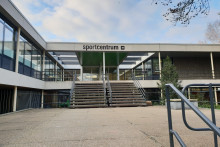According to Peter Chemweno, assistant professor in Advanced Manufacturing, present programmes in engineering at UT are largely focused on technology. ‘With Humanitarian Engineering we combine engineering with social science. While we believe that both social and technical solutions are needed to tackle the complex humanitarian challenges, as described by the United Nations’ Sustainable Development Goals (SDGs). One of the main ones being poverty alleviation.’
'New engineers'
The Humanitarian Engineering action has existed at UT for some time and the new master’s programme will add an extra educational pillar to it, says Chemweno. ‘We want to start by training good engineers who are also aware of the local challenges. Take for example the development of a water filtration system. If it is designed here in the Netherlands, where we have high water quality, it may not meet the local challenges in, for example, a refugee camp. Our ‘new engineers’ are trained to have an eye for the needs of local communities and to find and adapt technical solutions to suit those local needs. This goes beyond the traditional way of training engineers.’
Recently, a survey was conducted to find out how many students would be interested in the new programme, says Alberto Martinetti, assistant professor in Maintenance Engineering. ‘The results were quite positive: both Dutch and international students showed interest.’ The new study programme is a collaboration between the faculties of ET, BMS and ITC, he continues. ‘We are not only focusing on engineers, but also, for example, on students with social science background. Students are trained to combine knowledge from several academic disciplines and function in a range of cultural and political systems.’
Shaping 2030
The student will be offered a programme in which Challenge-Based Learning (CBL) plays a key role, says Martinetti. Students engage in projects based on social problems in areas as diverse as water and sanitation, healthcare, infrastructure and institutional design. ‘This fits in with the UT's vision Shaping 2030, in which social impact is an important principle’, Chemweno knows.
Besides Martinetti and Chemweno, Jelle Ferwerda was previously the quartermaster for exploring the possibility of a master’s programme for Humanitarian Engineering. In 2021 Eva Blokhuis joined the team for developing the final programme. In the first semester of the coming academic year, a minor in Humanitarian Engineering will already start. ‘Think of it as an appetizer for bachelor's students', says Martinetti. ‘In this way, we want to keep the momentum going until the actual master's programme starts in 2024.’








